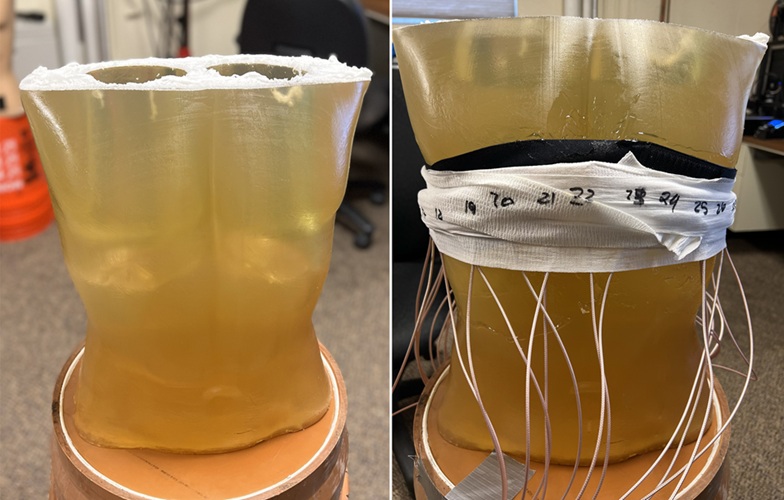Novel Breast Imaging System Proves As Effective As Mammography
|
By MedImaging International staff writers Posted on 22 Apr 2024 |

Breast cancer remains the most frequently diagnosed cancer among women. It is projected that one in eight women will be diagnosed with breast cancer during her lifetime, and one in 42 women who turn 50 today will be diagnosed before the age of 60. Various screening and diagnostic technologies are employed to detect cancers early and enhance treatment outcomes. Mammography is currently the predominant imaging method, yet it has its limitations, especially in detecting cancers in dense breast tissue where 10-15% of cases yield inconclusive results and raise safety concerns. Now, a new clinical trial has found a highly accurate, 100% safe, and painless breast imaging technology to be as effective as digital breast tomosynthesis (DBT), also known as 3D mammography.
The Breast Acoustic CT system from QT Imaging Holdings (QTI, Novato, CA, USA) represents a breakthrough in non-invasive breast imaging. This FDA-cleared system utilizes both transmission and reflection ultrasound to provide detailed and complementary information about breast tissue, enabling a more effective assessment of breast health. This cutting-edge technology produces volumetric 3D images accurately and precisely, without the need for contrast agents or exposure to radiation. The company has now announced positive results from its second blinded multi-reader multi-case study, evaluating the diagnostic efficacy of the Breast Acoustic CT Scans for mass detection.
The comparative study involved 24 breast radiologists who reviewed 177 selected cases, including 66 with cancer, atypia, or a solid mass, and 111 normal or with non-solid benign abnormalities. The results demonstrated that QTI’s Breast Acoustic CT matches the effectiveness of DBT, with the area under the receiver operating characteristic curve (AUC) showing statistical non-inferiority to DBT, within a -0.05 AUC difference margin. This confirms that QTI’s technology is comparably effective in detecting breast lesions, with high specificity in identifying benign cysts, thus potentially reducing benign recall rates. Notably, breast cancer in women under 40, while less common, tends to be more aggressive and linked to poorer survival rates. Standard screening mammograms are generally not recommended for this age group due to the balance of risks and benefits. However, the findings from this study suggest that QTI’s technology could provide a much-needed potential alternative for younger women for whom traditional mammography is not advised.
“We are encouraged by the consistent high performance of QTI’s technology, especially in women with dense breasts,” said Dr. Bilal Malik, Chief Science Officer. “Along with the previously published results and from comparison of QTI’s scans with mammography, these trial results will be valuable for our planned FDA submission for a screening indication in younger women identified with above-average risk for developing breast cancer and who have not yet reached the age for conventional mammography-based screening.”
Latest Radiography News
- AI Radiology Tool Identifies Life-Threatening Conditions in Milliseconds

- Machine Learning Algorithm Identifies Cardiovascular Risk from Routine Bone Density Scans
- AI Improves Early Detection of Interval Breast Cancers
- World's Largest Class Single Crystal Diamond Radiation Detector Opens New Possibilities for Diagnostic Imaging
- AI-Powered Imaging Technique Shows Promise in Evaluating Patients for PCI
- Higher Chest X-Ray Usage Catches Lung Cancer Earlier and Improves Survival
- AI-Powered Mammograms Predict Cardiovascular Risk
- Generative AI Model Significantly Reduces Chest X-Ray Reading Time
- AI-Powered Mammography Screening Boosts Cancer Detection in Single-Reader Settings
- Photon Counting Detectors Promise Fast Color X-Ray Images
- AI Can Flag Mammograms for Supplemental MRI
- 3D CT Imaging from Single X-Ray Projection Reduces Radiation Exposure
- AI Method Accurately Predicts Breast Cancer Risk by Analyzing Multiple Mammograms
- Printable Organic X-Ray Sensors Could Transform Treatment for Cancer Patients
- Highly Sensitive, Foldable Detector to Make X-Rays Safer
- Novel Breast Cancer Screening Technology Could Offer Superior Alternative to Mammogram
Channels
MRI
view channel
New MRI Technique Reveals Hidden Heart Issues
Traditional exercise stress tests conducted within an MRI machine require patients to lie flat, a position that artificially improves heart function by increasing stroke volume due to gravity-driven blood... Read more
Shorter MRI Exam Effectively Detects Cancer in Dense Breasts
Women with extremely dense breasts face a higher risk of missed breast cancer diagnoses, as dense glandular and fibrous tissue can obscure tumors on mammograms. While breast MRI is recommended for supplemental... Read moreUltrasound
view channel
New Medical Ultrasound Imaging Technique Enables ICU Bedside Monitoring
Ultrasound computed tomography (USCT) presents a safer alternative to imaging techniques like X-ray computed tomography (commonly known as CT or “CAT” scans) because it does not produce ionizing radiation.... Read more
New Incision-Free Technique Halts Growth of Debilitating Brain Lesions
Cerebral cavernous malformations (CCMs), also known as cavernomas, are abnormal clusters of blood vessels that can grow in the brain, spinal cord, or other parts of the body. While most cases remain asymptomatic,... Read moreNuclear Medicine
view channel
New Imaging Approach Could Reduce Need for Biopsies to Monitor Prostate Cancer
Prostate cancer is the second leading cause of cancer-related death among men in the United States. However, the majority of older men diagnosed with prostate cancer have slow-growing, low-risk forms of... Read more
Novel Radiolabeled Antibody Improves Diagnosis and Treatment of Solid Tumors
Interleukin-13 receptor α-2 (IL13Rα2) is a cell surface receptor commonly found in solid tumors such as glioblastoma, melanoma, and breast cancer. It is minimally expressed in normal tissues, making it... Read moreGeneral/Advanced Imaging
view channel
CT Colonography Beats Stool DNA Testing for Colon Cancer Screening
As colorectal cancer remains the second leading cause of cancer-related deaths worldwide, early detection through screening is vital to reduce advanced-stage treatments and associated costs.... Read more
First-Of-Its-Kind Wearable Device Offers Revolutionary Alternative to CT Scans
Currently, patients with conditions such as heart failure, pneumonia, or respiratory distress often require multiple imaging procedures that are intermittent, disruptive, and involve high levels of radiation.... Read more
AI-Based CT Scan Analysis Predicts Early-Stage Kidney Damage Due to Cancer Treatments
Radioligand therapy, a form of targeted nuclear medicine, has recently gained attention for its potential in treating specific types of tumors. However, one of the potential side effects of this therapy... Read moreImaging IT
view channel
New Google Cloud Medical Imaging Suite Makes Imaging Healthcare Data More Accessible
Medical imaging is a critical tool used to diagnose patients, and there are billions of medical images scanned globally each year. Imaging data accounts for about 90% of all healthcare data1 and, until... Read more
Global AI in Medical Diagnostics Market to Be Driven by Demand for Image Recognition in Radiology
The global artificial intelligence (AI) in medical diagnostics market is expanding with early disease detection being one of its key applications and image recognition becoming a compelling consumer proposition... Read moreIndustry News
view channel
GE HealthCare and NVIDIA Collaboration to Reimagine Diagnostic Imaging
GE HealthCare (Chicago, IL, USA) has entered into a collaboration with NVIDIA (Santa Clara, CA, USA), expanding the existing relationship between the two companies to focus on pioneering innovation in... Read more
Patient-Specific 3D-Printed Phantoms Transform CT Imaging
New research has highlighted how anatomically precise, patient-specific 3D-printed phantoms are proving to be scalable, cost-effective, and efficient tools in the development of new CT scan algorithms... Read more
Siemens and Sectra Collaborate on Enhancing Radiology Workflows
Siemens Healthineers (Forchheim, Germany) and Sectra (Linköping, Sweden) have entered into a collaboration aimed at enhancing radiologists' diagnostic capabilities and, in turn, improving patient care... Read more














.jpeg)





